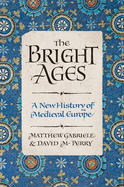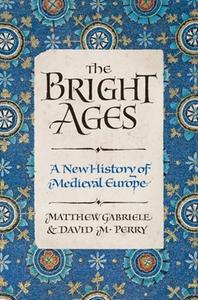
 In The Bright Ages: A New History of Medieval Europe, Virginia Tech medieval studies professor Matthew Gabriele and historian and journalist David M. Perry offer a spirited rebuttal to what they call the "myth of the Dark Ages," a "centuries-old understanding of the medieval world that sees it cast in shadow, only hazily understood, fixed and unchanging, but ultimately the opposite of what we want our modern world to be." Instead, in this fast-moving popular history that roughly spans the time from the middle of the fifth century to the Black Death that began in the 1340s, they succeed in painting what they propose as a "much more complicated, more interesting picture of the period," one that rescues this epoch from both those who misunderstand it and, perhaps more dangerously, others who misrepresent it.
In The Bright Ages: A New History of Medieval Europe, Virginia Tech medieval studies professor Matthew Gabriele and historian and journalist David M. Perry offer a spirited rebuttal to what they call the "myth of the Dark Ages," a "centuries-old understanding of the medieval world that sees it cast in shadow, only hazily understood, fixed and unchanging, but ultimately the opposite of what we want our modern world to be." Instead, in this fast-moving popular history that roughly spans the time from the middle of the fifth century to the Black Death that began in the 1340s, they succeed in painting what they propose as a "much more complicated, more interesting picture of the period," one that rescues this epoch from both those who misunderstand it and, perhaps more dangerously, others who misrepresent it.
Gabriele and Perry blend a chronological and subject matter approach. They're especially fond of debunking popularly held views of the Middle Ages--Rome never "fell" in 476 C.E., in their opinion, and life was anything but static, as "many people roamed far from home in search of fortune, fame, knowledge, sanctity, diplomacy, or escape"--to cite but two of their myth-busting claims. While The Bright Ages doesn't purport to offer a comprehensive survey of the Middle Ages, it does provide readers with a useful overview of and context for the main historical events of the age, among them the shift of the Roman Empire's center of gravity eastward to Constantinople, the rise of Islam and the Crusades.
The authors move with ease from describing broad social and cultural trends to more intimate subjects. Especially informative are concise portraits of figures like Maimonides, the 12th-century Jewish physician who attempted to apply Aristotelian logic to the task of reconciling science and religion, and Genghis Khan, leader of the Mongol Empire in the 13th century, who played a significant role in melding the cultures of East and West. Gabriele and Perry are especially intent on refuting the attempts of white supremacists who misrepresent the past and who "continue to reach back to medieval European history as a way to tell a story about whiteness, a sense of lost (but imagined) masculinity, and the need to shed blood."
Matthew Gabriele and David M. Perry liberate the Middle Ages from stereotypes and half-truths in The Bright Ages, revealing that world as "not simple or clean, but messy and human." If their book sparks more thoughtful interest in the period and a continuing reappraisal of its importance in the history of civilization, they will have accomplished their goal. --Harvey Freedenberg, freelance reviewer
Shelf Talker: Two historians illuminate the "Dark Ages" in this lively account of a misunderstood era.

